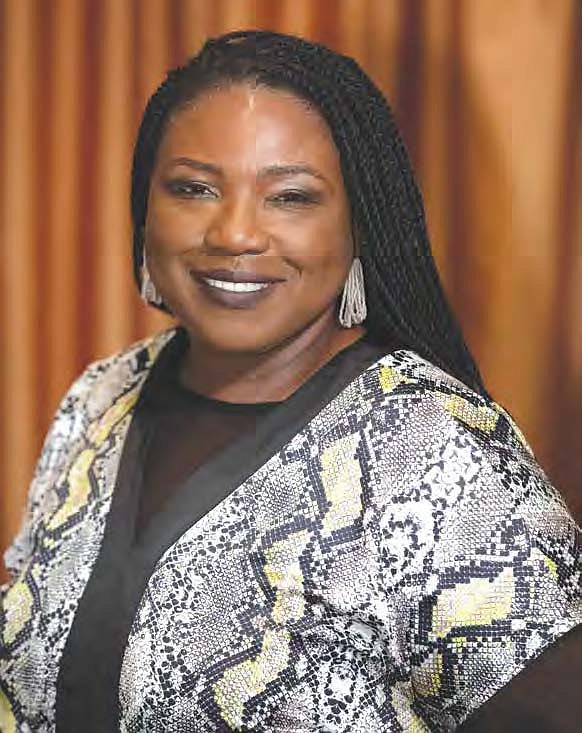American Library Association wants people to read, sign-up for library card
Tracie Hall is the Executive Director of the American Library
Association. PHOTO BY AMERICAN LIBRARY ASSOCIATION.
By Tia Carol Jones
Banned Books Week will take place from Sunday, Sept. 18th - Saturday, Sept. 24th. The American Library Association wants to celebrate the freedom to read.
The week was launched in 1982 and invites people to learn more about the kinds of books that are banned and why they are banned.
“We want to really raise the visibility of the threat of censorship and the harm that it causes,” said Tracie Hall, Executive Director of the American Library Association. “As people will see ... oftentimes the kinds of books that are banned are really books that are written by and for communities whose voices are suppressed.”
Hall highlighted the fact that a lot of books that have been banned are written by People of Color, people who identify as LGBTQIA+ and are written on topics of social justice, equity and inclusion. Hall believes some of the books that are banned are ones that people should be reading and discussing with their families.
Hall said the last time books were banned at the level they have been banned since 2020, was the McCarthy era in the 1950s. She said today, libraries and librarians are being targeted for protecting free speech and the freedom to read.
Some books that are banned include Angie Thomas’ “The Hate U Give,” Toni Morrison’s “The Bluest Eye” and Alice Walker’s “The Color Purple.”
“One thing you see is that some of these themes that were banned and problematized, years ago and today, are the very same things we need to be talking about if we want to make living, not only in this country but in this world, sustainable,” Hall said.
As the first African American woman to lead the American Library Association, Hall is fighting to dismantle racism within the library system. She recognizes her own upbringing represents some of the values the American Library Association stands for – equity of access, inclusion and intellectual freedom. She thinks a lot about literacy and how critical it is to life. Hall’s grandmother was insistent that she go to the library, have a library card and check out books, and attend programs there.
September is Library Card Sign-Up Month and the ALA is encouraging people to get acquainted with their library and get a library card.
“We consider the library card the most powerful card in your wallet because libraries open you up to thousands of programs, in-person and online, millions of books and resources and magazines and online databases. It’s absolutely free,” she said.
Hall said there is something for everyone at a library. She encouraged people who haven’t visited the library in a while to stop in. Also, people who aren’t sure if their library card is current can stop in to see if their library card is up to date, or people can sign up for a library card, if they don’t have one.
“Libraries are really representative of our greater Democratic values and are the bedrock of a Democracy, because libraries are places where people, regardless of their racial, economic, linguistic background, can have access to and ownership in. Just having a library card allows you to have access to lifelong education for free,” Hall said.
For more information about the American Library Association, visit www.ala.org.
Latest Stories
- HARD ROCK CASINO NORTHERN INDIANA DONATES $500K TO LAKE RIDGE NEW TECH SCHOOLS
- RICH TOWNSHIP & THE VILLAGE OF MATTESON SET TO HOST THE WORLD’S LARGEST BABY SHOWER FOR HUNDREDS OF NEW EXPECTING MOTHERS
- CREATE Program Partners Celebrate their Education Commitment’s 5th Year with over $700,000 in STEM Contributions to Southside Schools and Educational Institutions
- Sprite Reimagines the Legendary Obey Your Thirst Campaign with Modern Icons Anthony Edwards and Sha'Carri Richardson
- Pink Noire Beauty Supply & Cosmetics Celebrates Second Anniversary with Release of New Braid and Loc Gel
- Prosperity Now Announces the RISE Challenge to Inspire Innovation and Economic Empowerment
- Oakwood University Crowned the 35th Honda Campus All-Star Challenge National Champion
- Mayfestiversary Returns Memorial Day Weekend 2024
- Culver’s Offers Single Scoop of Fresh Frozen Custard for $1 Donation to Local Agriculture Education Initiatives on May 2
- Jiménez Opens Up Resources for Organizations Combating Homelessness
Latest Podcast
This Is Life

